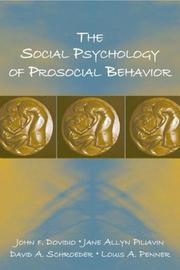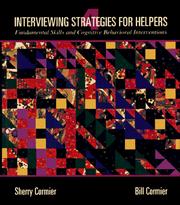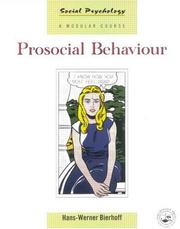| Listing 1 - 10 of 16 | << page >> |
Sort by
|

ISBN: 9780805849363 080584936X 9780805849356 0805849351 9781351540520 1351540521 9781351540506 1351540505 Year: 2006 Publisher: Mahwah, N.J. : Lawrence Erlbaum Associates,
Abstract | Keywords | Export | Availability | Bookmark
 Loading...
Loading...Choose an application
- Reference Manager
- EndNote
- RefWorks (Direct export to RefWorks)
Written by four leading researchers in the study of prosocial behavior, 'The Social Psychology of Prosocial Behavior' examines prosocial behavior from a new multilevel perspective that explores the diverse influences that promote actions for the benefit of others and the ways that prosocial actions can be manifested. The authors expand the breadth of the field, incorporating analyses of biological and genetic factors that predispose individuals to prosocial behavior. They identify both the common and the unique processes that underlie the broad spectrum of prosocial behavior. Each chapter begins with a question about prosocial behavior and ends with a summary that answers the question. The final chapter summarizes the questions and the answers that research provides. Conceptual models that elaborate on and extend the multilevel approach to prosocial behavior are used to tie these findings together. 'The Social Psychology of Prosocial Behavior' addresses the evolution of altruistic tendencies and other biological explanations of why humans are predisposed to be prosocial; how the situation and motives that are elicited by these situations affect when and how people help; the causes and maintenance of long-term helping, such as volunteering; how prosocial behavior changes over time and the developmental processes responsible for these changes; the consequences of helping for both the people who provide it and those who receive it; and helping and cooperation within and between groups and the implications of these actions. ' 'This accessible text is ideal for advanced courses on helping and altruism or prosocial behavior, taught in psychology, sociology, management, political science, and communication, or for anyone interested in learning more about prosocial behavior in general.
Helping behavior. --- Social psychology. --- Comportement d'aide --- Psychologie sociale --- Helping behavior --- Social psychology

ISBN: 0292714165 9780292714168 Year: 2006 Publisher: Austin University of Texas Press
Abstract | Keywords | Export | Availability | Bookmark
 Loading...
Loading...Choose an application
- Reference Manager
- EndNote
- RefWorks (Direct export to RefWorks)
Humane ideals were central to the image Athenians had of themselves and their city during the classical period. Tragic plays, which formed a part of civic education, often promoted pity and compassion. But it is less clear to what extent Athenians embraced such ideals in daily life. How were they expected to respond, emotionally and pragmatically, to the suffering of other people? Under what circumstances? At what risk to themselves? In this book, Rachel Hall Sternberg draws on evidence from Greek oratory and historiography of the fifth and fourth centuries BCE to study the moral universe of the ancient Athenians: how citizens may have treated one another in times of adversity, when and how they were expected to help. She develops case studies in five spheres of everyday life: home nursing, the ransom of captives, intervention in street crimes, the long-distance transport of sick and wounded soldiers, and slave torture. Her close reading of selected narratives suggests that Athenians embraced high standards for helping behavior--at least toward relatives, friends, and some fellow citizens. Meanwhile, a subtle discourse of moral obligation strengthened the bonds that held Athenian society together, encouraging individuals to bring their personal behavior into line with the ideals of the city-state.
Helping behavior --- Caring --- Comportement d'aide --- Humanité (Morale) --- History --- Histoire --- Athens (Greece) --- Athènes (Grèce) --- Moral conditions --- History. --- Conditions morales --- Humanité (Morale) --- Athènes (Grèce)

ISBN: 2707131903 9782707131904 Year: 2000 Volume: 86. Publisher: Paris : La Découverte,
Abstract | Keywords | Export | Availability | Bookmark
 Loading...
Loading...Choose an application
- Reference Manager
- EndNote
- RefWorks (Direct export to RefWorks)
Altruism --- Gifts --- Generosity --- Welfare state --- Altruisme --- Cadeaux --- Générosité --- Etat providence --- Ceremonial exchange --- Exchange --- Don --- Comportement d'aide --- Anthropologie économique --- Générosité

ISBN: 0534349161 Year: 1998 Publisher: Pacific Grove, CA : Brooks/Cole Publishing Company,
Abstract | Keywords | Export | Availability | Bookmark
 Loading...
Loading...Choose an application
- Reference Manager
- EndNote
- RefWorks (Direct export to RefWorks)
Behavior therapy. --- Cognitive therapy. --- Counseling. --- Helping behavior. --- Interviewing. --- Methoden en technieken --- vergader- en gesprekstechniek, rapportage --- vergader- en gesprekstechniek, rapportage. --- Accompagnement individuel --- Thérapie cognitive --- Thérapie comportementale --- Travailleurs sociaux --- Intervention --- Comportement d'aide. --- Entretiens en psychologie. --- Thérapie cognitivo-comportementale.
Book
ISBN: 2747503321 9782747503327 Year: 2001 Publisher: Paris : L'Harmattan,
Abstract | Keywords | Export | Availability | Bookmark
 Loading...
Loading...Choose an application
- Reference Manager
- EndNote
- RefWorks (Direct export to RefWorks)
Le propos de cet ouvrage est d'analyser le processus d'accompagnement : dans quelles situations un accompagnement est-il pertinent? Que fait-on exactement quand on accompagne quelqu'un? En quoi l'accompagnement diffère-t- il d'autres postures éducatives? Quel principe éthique peut servir de repère aux accompagnateurs . Peut-on se former à l'accompagnement?
Helping behavior --- Counseling --- Training --- Interpersonal relations --- Comportement d'aide --- Formation --- Relations humaines --- Accompagnement (Psychologie). --- Aufsatzsammlung. --- Comportement d'aide. --- Counseling. --- Helping Behavior. --- Helping behavior. --- Intégration sociale. --- Listening. --- Mentorat en éducation. --- Mentoring in education. --- Mortalité. --- Psychologie de l'éducation. --- Pädagogische Psychologie. --- Relation d'aide. --- Référentiel (éducation). --- Travailleurs sociaux. --- Vocational guidance. --- accompagnement (éducation) --- accompagnement (éducation). --- accompagnement des mourants --- accompagnement des mourants. --- accompagnement social --- accompagnement --- accompagnement. --- counseling. --- définition. --- formation (éducation). --- milieu scolaire. --- Écoute (Psychologie). --- Écoute (psychologie). --- Éducation. --- Éthique. --- Education. --- Formation (éducation) --- éducation.
Book
ISBN: 9780262013598 0262013592 Year: 2009 Publisher: Cambridge, Mass. MIT Press
Abstract | Keywords | Export | Availability | Bookmark
 Loading...
Loading...Choose an application
- Reference Manager
- EndNote
- RefWorks (Direct export to RefWorks)
Drop something in front of a two-year-old, and she's likely to pick it up for you. This is not a learned behavior, psychologist Michael Tomasello argues. Through observations of young children in experiments he himself has designed, Tomasello shows that children are naturally--and uniquely--cooperative. Put through similar experiments, for example, apes demonstrate the ability to work together and share, but choose not to. As children grow, their almost reflexive desire to help--without expectation of reward--becomes shaped by culture. They become more aware of being a member of a group. Groups convey mutual expectations, and thus may either encourage or discourage altruism and collaboration. Either way, cooperation emerges as a distinctly human combination of innate and learned behavior.In Why We Cooperate, Tomasello's studies of young children and great apes help identify the underlying psychological processes that very likely supported humans' earliest forms of complex collaboration and, ultimately, our unique forms of cultural organization, from the evolution of tolerance and trust to the creation of such group-level structures as cultural norms and institutions.Scholars Carol Dweck, Joan Silk, Brian Skyrms, and Elizabeth Spelke respond to Tomasello's findings and explore the implications
Helping behavior. --- Altruism --- Cooperativeness --- Social norms --- Altruism. --- Cooperativeness. --- Social norms. --- Social psychology --- Helping behavior --- Comportement d'aide --- Altruisme --- Coopération (Psychologie) --- Normes sociales --- Sociale psychologie --- Folkways --- Norms, Social --- Rules, Social --- Social rules --- Manners and customs --- Social control --- Behavior, Helping --- Human behavior --- Interpersonal relations --- Caring --- Cooperation (Psychology) --- Altruistic behavior --- Unselfishness --- Conduct of life
Book
ISBN: 9065500731 Year: 1999 Volume: 3 Publisher: Hilversum Verloren
Abstract | Keywords | Export | Availability | Bookmark
 Loading...
Loading...Choose an application
- Reference Manager
- EndNote
- RefWorks (Direct export to RefWorks)
History --- Christian spirituality --- Pastoral counseling --- Helping behavior --- Counseling pastoral --- Comportement d'aide --- Religious aspects --- Catholic Church --- Histoire --- Aspect religieux --- Eglise catholique --- Netherlands --- Pays-Bas --- Religious life and customs --- Vie religieuse --- 248.151 --- Keuze van een geestelijke leiding --- 248.151 Keuze van een geestelijke leiding --- History.

ISBN: 0863777740 0863777732 0203989422 9780203989425 9786610154340 6610154341 9780863777738 9780863777745 9781135471125 1135471126 9781135471071 113547107X 9781135471118 1135471118 1280154349 Year: 2002 Publisher: New York Psychology Press
Abstract | Keywords | Export | Availability | Bookmark
 Loading...
Loading...Choose an application
- Reference Manager
- EndNote
- RefWorks (Direct export to RefWorks)
How can social bonds in society be strengthened? How do we learn and develop prosocial behaviour?This comprehensive textbook provides up-to-date coverage of the social phenomenon of prosocial behaviour, incorporating all the major developments in the fields of developmental and social psychology. The first section identifies different forms of prosocial behaviour, including estimates of prevalence in everyday situations and the controversy between biological and cultural perspectives as explanatory models of prosocial behaviour. The second and third sections focus on learning and dev
Helping behavior. --- Altruism. --- Interpersonal relations. --- Comportement d'aide --- Altruisme --- Relations humaines --- Psychology, Applied. --- #PBIB:2002.4 --- Sociale psychologie --- sociale interactie --- sociale interactie. --- Sociale interactie. --- Human relations --- Interpersonal relationships --- Personal relations --- Relations, Interpersonal --- Relationships, Interpersonal --- Social behavior --- Social psychology --- Object relations (Psychoanalysis) --- Altruistic behavior --- Unselfishness --- Conduct of life --- Helping behavior --- Behavior, Helping --- Human behavior --- Interpersonal relations --- Altruism --- Caring
Book
ISBN: 9514103939 9514103939 9789514103933 Year: 1980 Volume: 24 Publisher: Helsinki Suomalainen Tiedeakatemia
Abstract | Keywords | Export | Availability | Bookmark
 Loading...
Loading...Choose an application
- Reference Manager
- EndNote
- RefWorks (Direct export to RefWorks)
Helping behavior in children --- Personality in children. --- Parental influences --- Comportement d'aide chez l'enfant --- Personnalité chez l'enfant --- Parents --- Influence --- Personality in children --- Child psychology --- Influences, Parental --- Influence (Psychology) --- Parent and child --- Helping behavior in children. --- Parental influences. --- Helfen. --- Kind. --- Personnalité chez l'enfant
Book
ISBN: 9789048634057 9048634059 Year: 2018 Publisher: Brugge Die Keure
Abstract | Keywords | Export | Availability | Bookmark
 Loading...
Loading...Choose an application
- Reference Manager
- EndNote
- RefWorks (Direct export to RefWorks)
In 2005 verscheen het boek ?Beroepsgeheim en hulpverlening?, dat voor het eerst het vraagstuk van het beroepsgeheim diepgaand bestudeerde vanuit de specifieke invalshoek van de welzijnszorg en de hulpverlening. Het boek groeide daarmee uit tot een standaardwerk in de sector.Nu ligt een volledig nieuwe editie van dit boek voor. De maatschappij, de wetgeving, de hulpverleningspraktijk en de onderzoekswereld zijn niet stil blijven staan. De druk om ?verantwoordelijkheid te nemen? verhoogt, nieuwe uitzonderingen op het beroepsgeheim komen tot stand, hulpverleners reflecteren over hun positie? Dit boek verenigt deze ontwikkelingen en evoluerende inzichten. Het bespreekt op een juridisch-wetenschappelijk verantwoorde en tegelijk toegankelijke wijze het beroepsgeheim, zowel in het algemeen als specifiek in de hulpverlening. Bijzondere aandacht gaat naar o.a. het gedeeld beroepsgeheim, mogelijke vormen van samenwerking tussen justitie en hulpverlening, het verschil tussen beroepsgeheim en discretieplicht.Hiermee reikt dit boek een kader aan waarmee sectoren, organisaties en hulpverleners richting kunnen bepalen in het omgaan met complexe vraagstukken over beroeps geheim en informatiedelingBron: https://www.diekeure.be/nl-be/professional/9214/beroepsgeheim-en-hulpverlening
Professional ethics. Deontology --- Human rights --- Social law. Labour law --- beroepsgeheim --- toegepaste filosofie --- hulpverlening --- deontologie --- Belgium --- Beroepsethiek --- Recht --- België --- Hulpverlening --- Beroepsgeheim --- Maatschappelijk werk --- Sociaal werk (beroep) --- verpleegkunde --- vroedkunde --- Secret professionnel --- Déontologie --- Secret médical --- Médecine --- Droit --- Belgique --- Helping behavior --- Comportement d'aide --- Confidential communications --- Professional ethics --- Déontologie professionnelle --- Law and legislation
| Listing 1 - 10 of 16 | << page >> |
Sort by
|

 Search
Search Feedback
Feedback About UniCat
About UniCat  Help
Help News
News